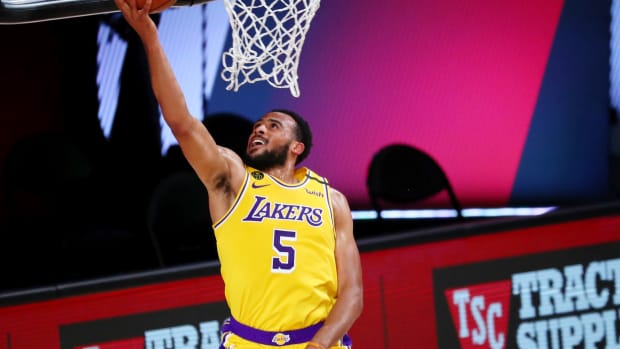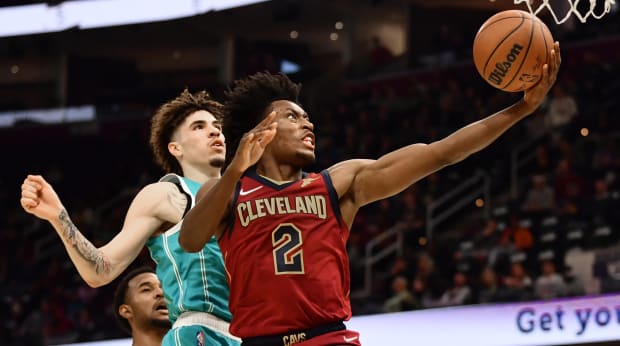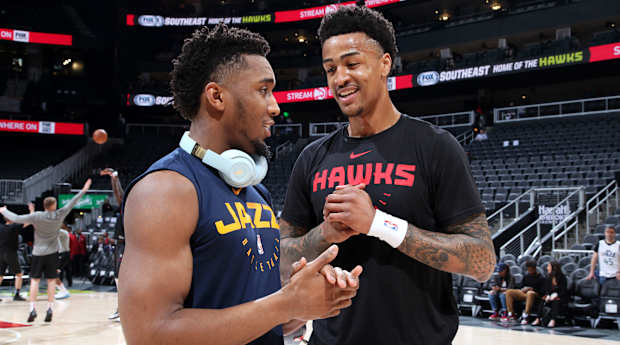Kevin Durant’s request to play for a new franchise has gridlocked most of the NBA offseason. So until the Nets deal the best player they’ve ever employed (or decide no package is impressive enough to move on), here are a few thought-provoking fake trades to consider before the 2022–23 season.
The Lakers think about the present
Lakers get Doug McDermott
Spurs get Talen Horton-Tucker, Max Christie and a 2023 second-round pick

Very little explanation is required here. The Lakers get one of the best three-point shooters in the world, a 30-year-old still in his prime on a decent contract ($13.7 million this year and the same amount in 2023–24) without sacrificing meaningful draft capital, while the Spurs get younger.
McDermott is a career 40.9% three-point shooter who made 42.2% of his outside shots in 51 games with the Spurs last season (his season ended in March when he badly sprained his ankle in a game against the Pacers). Beside Anthony Davis, LeBron James and (for now) Russell Westbrook, he’s an ideal complementary piece on the offensive end. McDermott moves well without the ball. He’s restless and economical, curling into the paint off a dribble handoff or fading into a tough look out of a tight window, large enough to fire unbothered by a rear contest—the archetypal weapon LeBron James has propped up and fed off his entire career.
McDermott won’t single-handedly keep the Lakers’ palace from shrinking into a gazebo, but the decision to trade for a skill set they need might inject some confidence into a front office/ownership group that deserve so little.
Meanwhile, the rebuilding Spurs get two youngsters whose best days are (hopefully) ahead. Horton-Tucker is somehow still only 21 years old, coming off a year that was dispiriting enough to drop his trade value to a Mariana Trench depth (177 players logged more than 1,500 minutes last season and only six had a lower true shooting percentage). With one more year before THT can opt out of his deal, San Antonio gets a chance to see what it has and, if all works well, either showcase him before the trade deadline and flip his contract for more desirable assets or start a relationship with someone who once held up potential blockbuster trades.
Christie, a 19-year-old rookie out of Michigan State whom L.A. just signed to a two-way contract, doubles as a salary to make the deal legitimate and another untapped prospect who makes little sense on an urgent team that’s trying to win at the highest level.
The Lakers are in desperate need of a disciplined diet. They can’t eat whatever they want. The Spurs, however, are positioned to gorge. Horton-Tucker and Christie might not underscore everyone else on their roster, but growing talent is growing talent.

Ken Blaze/USA TODAY Sports
The Mavericks replace Jalen Brunson
Mavericks get Collin Sexton
Cavaliers get Tim Hardaway Jr.
Pacers get Dwight Powell, Isaac Okoro/Cedi Osman, Dallas’s lottery-protected first-round pick in 2027
This is … a lot. It’s a rare, complicated hypothetical that assumes a few things about each team that might not be true. For example: Do the Mavericks even like Collin Sexton enough to pay him big money, let alone part ways with a draft pick and two rotation players to get him? Do the Pacers even want to take this much salary on, draft pick aside? Would the Cavaliers be fine accelerating their time line a bit by going after a 30-year-old who’s coming off foot surgery and owed $53.7 million over the next three seasons? These are all questions worth asking, and in a vacuum the value of these individual assets arranged as they are is a bit lopsided. But it’s also easy to see how all teams could be happy with the outcome.
Before they extended Darius Garland with a designated max extension, the Cavaliers signed free agents Ricky Rubio (who tore his ACL in December) and Raul Neto. That’s three-point guards on a roster that also has Caris LeVert for another year. That’s a crowded depth chart before Sexton is even mentioned.
Despite a recent vote of confidence by Cavaliers president of basketball operations Koby Altman, Sexton, who’s returning from a torn meniscus back in early November, doesn’t make a ton of sense on this roster. At 6'1" he isn’t an ideal tag-team partner for Garland—even on a roster that has Evan Mobley and Jarrett Allen manning the frontcourt for the foreseeable future.
Assuming he’s healthy, Hardaway isn’t a long-term solution, either. But he’s a better choice over the next few years for a team that aspires to make noise in the 2023 postseason. The Cavs need established outside threats who can complement Garland’s pick-and-roll game and let all their bigs operate with a bit more space on dives and cuts. Hardaway didn’t shoot the ball particularly well last year, but drilled 40.9% of his spot-up tries in ’21 and 42.1% of them in ’20.
Also, for a city that isn’t seen as a free-agency destination, Hardaway may be a solid way for Cleveland to fill the cap space that could otherwise open up if it decided to let Kevin Love and LeVert walk next summer.
The Mavericks have had a pretty disappointing offseason so far. They lost their second-best player, Jalen Brunson, to the Knicks in free agency and then created a logjam at center by using their mid-level exception on JaVale McGee. Sexton isn’t the missing piece who can help lead Dallas to the Finals, but he’s the best available ballhandler who can fill Brunson’s shoes while being two years younger with significantly more speed and athleticism in his game.
Luka Dončić needs another playmaking shot creator by his side. Spencer Dinwiddie is solid, but Sexton can shift their pace to a different gear, as someone who averaged an efficient 24.3 points per game two years ago. Despite being undersized, Sexton gets to and finishes at the rim, with a respectable in-between game and adequate outside shot.
The obvious concern is on defense, where pairing Sexton and Dončić in a playoff series could spell disaster. But put Dallas’s thought process behind this deal in the same category as its recent trade for Christian Wood: a bet on Jason Kidd and his coaching staff’s ability to forge a defensive mentality in whoever’s on their roster. And with the ball, Sexton would have more space and the chance to square off against opponents that are preoccupied throwing a kitchen sink at Dončić than he otherwise did in Cleveland.
Now, actually acquiring Sexton is a little tricky because of base year compensation, which is why a third team is here to make the math work. This entire deal hinges on the size of Sexton’s next contract and whether he and Dallas can agree on the same number. For the sake of argument, let’s say it’s a flat four-year, $85 million deal—which is what the Raptors gave Fred VanVleet in 2020.
The most the Cavs could take back before they include more salary is about $13.4 million. Hardaway’s contract is $19.6 million next season. This is where the Pacers come in, as one of two teams that can fit enough salary to partake. (If the Pacers say no for any number of reasons—including how it would endanger their path to acquiring Deandre Ayton or any other use of their cap space as a dumping ground—the Mavs and Cavs can gauge the Spurs’ interest instead.)
The Pacers would be asked to take enough salary to drop Dallas under the apron (Powell’s $11 million expiring contract should do it) and money off Cleveland’s hands to make the trade legal (Isaac Okoro at $7 million or Cedi Osman at $7.4 million). To counteract any ambivalence about assuming roughly $18 million, a lottery-protected first-round pick from the Mavericks in 2027 would serve as an incentive.
Watch NBA live with fuboTV: Start a 7-day trial today!
That’s a lot to give up for Sexton, and Cleveland would have to really love Hardaway to participate. But assuming Sexton is healthy, the Mavs would be filling one of their biggest holes with the market’s best available talent. It’d be fun to see how it looks.

Jasear Thompson/NBAE/Getty Images
The Jazz give Donovan Mitchell a new wingman
Jazz receive John Collins
Hawks receive Jarred Vanderbilt, Bojan Bogdanović, Timberwolves’ first-round pick in 2023
To be clear I’m pretty sure this will never happen for a variety of reasons that mostly have to do with every major decision Danny Ainge has made since Utah’s season unceremoniously ended with a limp and a thud. Read the writing on the wall: Will Hardy is 34 and was just given a six-year contract to replace Quin Snyder as the organization’s fifth head coach since Hardy was born, franchise center Rudy Gobert was traded for a yacht load of future assets and Royce O’Neale (the team’s best and only perimeter defender) was traded for a first-round pick. If a major rebuild isn’t on the horizon, it’s already here.
By design, the Jazz will not be a good team in 2023. They may get even worse by cashing out on Donovan Mitchell, their 25-year-old, multiple-time All-Star guard whose trade value has taken a dip after an inexcusably limited showing in the first round. But with Mitchell under contract for at least three more seasons, Utah doesn’t need to do anything else quite yet. With or without him, the Jazz will probably miss the playoffs next year. And as they amble through the fog without Gobert lifting them up on both ends, maybe their owner, Ryan Smith, sees the massive combined haul of draft picks received for Gobert and O’Neale as an opportunity to retool around Mitchell with younger legs.
It’s highly unlikely but not impossible for the Jazz to simultaneously build along two time lines in an admirable attempt to avoid bottoming out, knowing all those draft picks from the Timberwolves and Nets are a bridge and a parachute at the same time. Try to win and build at the same time. Give Mitchell a bouncy 24-year-old sidekick who’s more polished offensively than Gobert ever will be. It’s a duo that can entertain and keep Utah on the periphery of relevance. Collins is an athletic marvel who can pop for threes and sky for lobs. He contributes to winning and can be a long-term third wheel. But in the short term, Collins—whose contract expires the same year as Mitchell’s—also isn’t good enough to keep the Jazz from enjoying a decent lottery pick in 2023.
Over in Atlanta, the Hawks might stick their noses up at this package. But if they could do any better than this they probably would have by now. Even though Collins is the best player in the trade, Bojan Bogdanović’s range and shot creation make sense on a roster that just lost Kevin Huerter and Danilo Gallinari.
Meanwhile, Jarred Vanderbilt is a defensive upgrade at the four and comfortable not to have any set plays called for him. With no outside shot to speak of, sharing the floor with Clint Capela is a nonstarter, but Vanderbilt should be able to play with Onyeka Okongwu some, and even back Capela up.
Vando is also only 23 years old and due less than $9 million through 2024. With De’Andre Hunter’s next deal in the pipeline, and Dejounte Murray and Okongwu not far behind, getting off Collins’s massive contract with two players who can replace some/most of his production for practically no long-term financial cost isn’t nothing. And after surrendering all the draft equity they did to get Murray, that ’23 first-round pick can’t be ignored—even if it’s in the 20s.
(This deal can’t happen until Aug. 30, because Vanderbilt was traded June 30, and 60 days need to pass before he’s in another transaction while aggregated with a teammate.)







